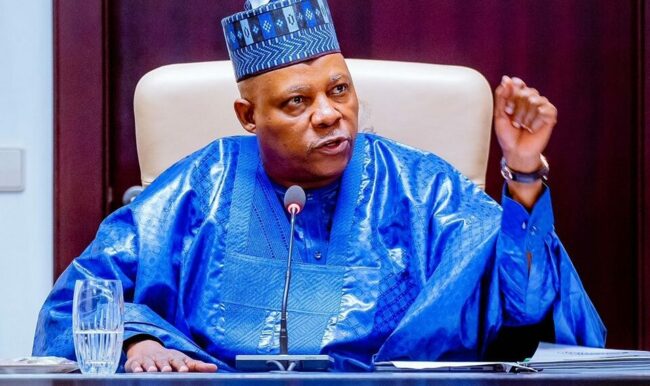

Vice President Kashim Shettima has observed that the number of out-of-school girls in the north is alarming and has stressed the need to prioritize girl child education in the country.
The Vice President has called for a concerted, multisectoral approach to address gender-based barriers to quality education.

Shettima delivered this message on Thursday when he declared open the International Conference on Girl Child Education in Nigeria, held at the Banquet Hall of the Presidential Villa in Abuja.
According to him, governments at all levels, traditional rulers, religious leaders, civil society organizations (CSOs), and partners in the donor community must come together “with a singular focus: ensuring that every Nigerian child, regardless of gender or geography, receives quality education.”
Shettima noted that the dignity of the girl child defines every civilization.
Represented at the event by the Deputy Chief of Staff to the President (Office of the Vice President), Senator Ibrahim Hadejia, the Vice President stated, “Whatever reforms we adopt to build a safe space for educating the girl child must be championed from within our communities.
“Policymaking involves all of us, and we must engage local leaders, traditional rulers, and religious figures to understand the implications of failing to educate the future of this nation.
“The most powerful tool we can offer the girl child is education. We must enhance educational programs that inform girls and women about their rights and the risks they face if denied the opportunity to make informed choices, especially in matters of health.”
Shettima implored the government’s partners in the donor community, including the World Bank, the African Development Bank, and other multilateral institutions, to make a generational difference.
“The dignity of the girl child defines every civilization, and today we are bound by a duty higher than merely observing the challenges before us. We bear the responsibility of setting the tone for this nation, and there is no greater calling than to prioritize the education of the girl child and other at-risk children. This is a mirror from which we cannot afford to look away because the consequences are dire,” he said.
Outlining statistics on out-of-school children in Nigeria, including the latest Multiple Indicator Cluster Survey (MICS), the Vice President warned that “each child abandoned to the streets is a liability that the nation will one day pay for.”
“We must remember that the child who remains out of school today will be a threat to their peers in the classroom tomorrow. We cannot afford to turn away from this reality, and the need for creative and innovative solutions is now more pressing than ever,” he added.
Shettima acknowledged, however, that while the issue of girl-child education haunts every nation, her vulnerability in this part of the globe is particularly pronounced.
He continued, “Her education is more than a moral obligation; it is the stabilizing force of our economic and social order. For every additional year a girl remains in school, her future earning potential increases, infant mortality rates decrease, and poverty levels in communities fall.
“We see this reflected in the Gender Parity Index, which shows that girls have almost caught up with boys at the primary school level, with a ratio of 0.99, and even surpass boys at the secondary school level, with a ratio of 1.08.
“However, these gains are at risk unless we intensify our interventions to reach every girl, particularly in areas where barriers remain strongest.”
The Vice President assured that the National Economic Council (NEC), which he chairs, has already set out to guarantee the future of the girl child, adopting education as one of its critical thematic areas of intervention.
He explained, “Alongside health, nutrition, and employability in a rapidly changing world, our Human Capital Development Programme is a radical response to the generational gaps in our education sector.
“We have set the ambitious goal of achieving a 0.6 score on the World Bank’s Human Capital Index, and we understand that the road to this future involves increasing years of schooling, improving the quality of education, and ensuring that no child—especially no girl child—is left vulnerable or out of school.”
Shettima regretted that the latest data further accentuates the urgency of addressing the issue, particularly in northern Nigeria, noting that “states in the North West and North East face the highest out-of-school rates.”
“We cannot allow ourselves to be held hostage by these frightening numbers. Now is the time to treat them as an emergency, and the only way forward is through state-specific action plans that address the unique needs and barriers in each region,” he added.
Earlier, the Chairman of the Nigeria Governors’ Forum (NGF) and Governor of Kwara State, Abdulrahman Abdulrazaq, expressed concern over the rising number of out-of-school children, pervasive learning poverty, and the insufficient capacity of teachers to foster empowerment through education.
ALSO READ: FG to harness diaspora healthcare professionals’ expertise
He expressed regret that despite efforts to reverse the situation, the empowerment of the girl child is still hindered by inadequate access to quality education.
He said the conference, under the theme “Girl Child Empowerment Through Quality Education,” is a clarion call for authorities to take decisive action to reverse the trend.
According to him, quality education remains the cornerstone of national socioeconomic development. Achieving this requires robust education financing, highly qualified teachers, comprehensive instructional materials, strong advocacy, and the provision of necessary infrastructure. Initiatives to re-enroll children in schools, improve learning outcomes, and secure adequate funding are essential to ensuring that every child receives a quality education.
He stated, “Our goals include enhancing basic numeracy and literacy, increasing primary school enrollment to reduce the number of out-of-school children, and ensuring smooth transitions from primary to secondary education. The states are resolutely committed to addressing these challenges for the betterment of our society.
“There is renewed vigor in advocating for increased education financing by the states. The NGF champions advocacy for effective and sustained budgetary resource allocation to the education sector at both federal and state levels. In 2022, states allocated N1 trillion (12%) of their total expenditures to education.
“This increased to N1.6 trillion in 2023 and further to N2.4 trillion in 2024, alongside the federal allocation of N2.2 trillion.”
Abdulrazaq noted that states including Lagos, Enugu, Kaduna, Abia, Ogun, Kano, Oyo, Jigawa, Niger, Akwa Ibom, and Kwara have made substantial contributions, with many meeting or exceeding the international benchmark of allocating at least 15% of their budgets to education.
“These efforts underscore the positive trajectory of education financing by subnational governments,” the NGF chairman said.








